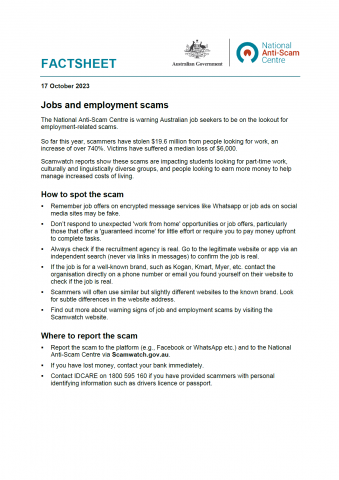The National Anti-Scam Centre is warning Australian job seekers to be on the lookout for employment-related scams.
So far this year, scammers have stolen $19.6 million from people looking for work, an increase of over 740%. Victims have suffered a median loss of $6,000.
Scamwatch reports show these scams are impacting students looking for part-time work, culturally and linguistically diverse groups, and people looking to earn more money to help manage increased costs of living.

How the scam works
These scams promise easy work from home, short hours and high pay. Scammers may message you directly through encrypted messaging platforms like WhatsApp, pretending to be real organisations or recruiters offering work.
People have also reported falling victim after responding to a job ad posted on social media.
The scams use a ‘gamification’ model. It feels like a game where you can clear levels to earn more money by completing tasks, referring friends, and investing more in the app.
You will be asked to make upfront payments to earn a wage.
The scammers will spend significant time with you, guiding you through the cryptocurrency platform and 'training' you on how to make payments.
Ultimately, they will keep your money.
Find out more about warning signs of job and employment scams.
Protect yourself
Never send money, you won’t get it back.
- Be careful if someone uses encrypted message services or social media to advertise work.
- Be suspicious of unsolicited ‘work from home’ job offers, particularly those that offer a 'guaranteed income' for little effort or require you to pay money upfront to complete tasks.
- If you're contacted by a recruitment agency, first confirm the job is real. Check their official website or app through an independent search – never use links in messages.
- If the job is for a well-known brand, use an email address or phone number on their website to contact them directly about the job.
- Check the website address. Scammers often use ones that are slightly different to the real one.
Where to report
- Report the scam to the platform (e.g., Facebook or WhatsApp) and to Scamwatch.
- If you have lost money, immediately contact your bank.
- Contact IDCARE on 1800 595 160 if you've provided scammers with personal identifying information, like your drivers licence or passport.
- If you're in financial hardship, contact the free National Debt Helpline on 1800 007 007 from 9.30am to 4.30pm, Monday to Friday.
By reporting to the National Anti-Scam Centre via Scamwatch, the community has helped us to identify and contact the targeted businesses and job platforms to ask them to remove or shut down the fake ads.
We're also sharing intelligence from reports with Australian law enforcement, AUSTRAC and Australian banks and Digital Currency Exchanges (DCEs) to help disrupt these scams.
Jobs and employment scams
Jobs and employment scams trick you into handing over your money by offering you a 'guaranteed' way to make fast money or a high-paying job for little effort.




